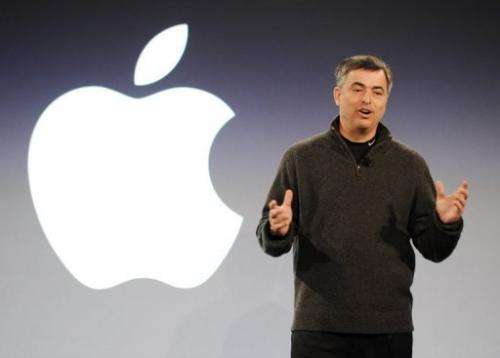Eddy Cue, an Apple senior vice president, speaks on February 2, 2011, at the Guggenheim Museum in New York. Cue downplayed the theory of an e-book price-fixing conspiracy at an antitrust trial Monday, saying publishers were already moving away from Amazon's model when Apple launched its iPad.
A top Apple executive downplayed the theory of an e-book price-fixing conspiracy at an antitrust trial Monday, saying publishers were already moving away from Amazon's model when Apple launched its iPad.
Eddy Cue, an Apple senior vice president, said in his second day of testimony that Apple introduced e-books for the iPad that were not available on Amazon, which was selling many popular e-book titles for $9.99.
"We were making available books immediately that weren't going to be available for months and at really great prices," Cue said as he was questioned by Apple attorney Orin Snyder in US federal court in New York.
"We didn't raise prices for books that weren't available."
Cue said that at the time, at least four major publishers had delayed books to Amazon or threatened to do so in a practice known as "windowing," because of dissatisfaction with the pricing model.
Cue's testimony sought to blunt the US government argument that Apple and major publishers conspired to end Amazon's pricing scheme and impose a new system with higher prices for electronic books when the iPad was introduced in 2010.
But Cue, in response to questions from US Justice Department lawyer Lawrence Buterman, acknowledged that some e-book prices did go up.
Cue admitted that the day of the iPad launch, a memoir by the late US senator Edward Kennedy, "True Compass," was not windowed and that Apple was selling the book for $14.99 while it retailed on Amazon for $9.99.
"For that book, that's correct," Cue said.
Buterman said that only 37 books were windowed, saying this was a relatively small number.
Cue countered that "37 could be a huge number if it's the right books."
Cue also came in for tough questioning about a December 21, 2009 email updating Apple's chief at the time, Steve Jobs, in which he said the publishers were generally pleased with Apple's stance because it "solves Amazon issue."
Buterman asked if "solving" the "Amazon issue" meant the publishers agreed to impose higher prices on other retailers.
But Cue denied this and said he was referring to following the publisher's demand that Apple not charge $9.99 for bestsellers.
"What I wanted was competitive pricing," Cue said.
The US Department of Justice has accused Apple of being the "chief ringleader" in a price-fixing scandal that has cost consumers hundreds of millions of dollars. The company denies all charges.
The case centers on an intense month and a half of negotiations between Apple and the six largest US publishers ahead of Apple's January 2010 launch of its iPad and the announcement of its e-bookstore.
Prior to then, the publishers sold books to Amazon and other online booksellers through a "retail" model in which the retailer set the price.
After Apple's entry, the industry shifted to an "agency" model, where the publisher sets the price and the online bookseller receives a 30 percent commission.
Apple has sought to put the blame on publishers for the increased cost of books.
At the time that Apple launched its iBooks store, Amazon already controlled up to 90 percent of the ebook market.
© 2013 AFP




















